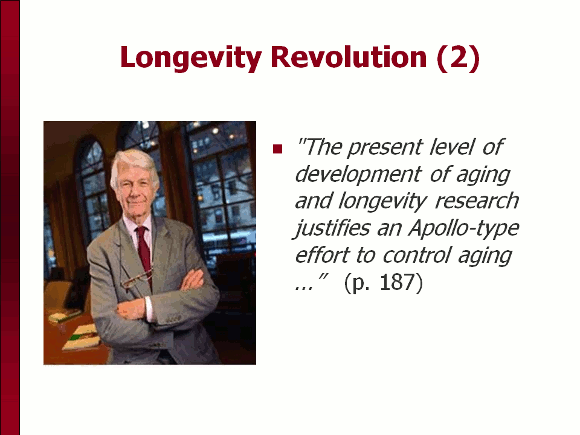Longevity in the 21st Century, PowerPoint
Demographic researchers Leonid Gavrilov and Natalia Gavrilova pointed me to a powerpoint of their latest presentation, titled How Long Will We Live in the 21st Century?:
We are pleased to share with you the power-point-presentation of our keynote lecture made recently at the international conference in Bermuda, which may be interesting to you.
The presentation is a good overview of presently established trends and viewpoints held in the mainstream of medical research. In essence, present trends lead to only modest gains in human life span if extrapolated - but extrapolation, always a dangerous undertaking, is particularly foolhardy in these early years of the biotechnology revolution. The oldest and most extensive demographic data is next to useless now:
Mortality trends before the 1950s are useless or even misleading for current forecasts because all the 'rules of the game' has been changed.
Further, the technologies that may lead to radical extension of the healthy human life span - such as realization of the Strategies for Engineered Negligible Senescence - are the most uncertain in terms of timing. The present pace of research is both rapid and unpredictable, and so is the time it will take for new paradigms of longevity science to become dominant in large research communities. The story of longevity in the 21st century is one of great unpredictability - but the flip side of that pronouncement is that the future is open to change. The more we do now to accelerate research and advocate longevity science, the sooner we'll see results.

I can understand why others often fail to see where the changes in the rate of progress regaring life extenson research are coming from. I find almost everything hinges on the concept of exponential growth in technology. I often discussed this with professional colleagues and even they could not really grasp the way exponential growth operates. The reason for this in my opinion is that the mind cannot conceive the concept of exponential growth in the same way that you cannot really perceive how large 1 billion is unless you convert it into something you can conceptualize. The best way to do this is to keep in mind that at an average rate of counting you would reach 1 million in 17 days but 1 billion would take you 32 years! We have the same problem with linear versus exponential growth. When I realised how hard it was to explain the concept I decided to draw up a list and it consists of the dates at which major discoveries arose. This list is on my site at http://drjohnty.com/Exponential_Growth.html I think that when anyone looks at this list it is clear that anti aging medicine is most likely very much set for significant breakthroughs. If the pattern on my site continues and indeed continually accelerates as history confirms then we are set for a degree of progress during course of this century which will be on a scale never before seen in history. My conclusion is that even if the trends are not repeated and progress slows to only 20/25% of that suggested by the calculations on exponential growth the developments in technology will still be so staggering as to be inconceivable from where we stand currently. Of course appropriate funding will accelerate the rate of progress but I think the overall pattern is very obvious as to where we are heading the only question is how fast we achieve the requisite technology for radical life extension.
Really interesting to know the stuffs. Are there sufficient scientific theories that can prove that which of the genetic factors are involved for the longevity?